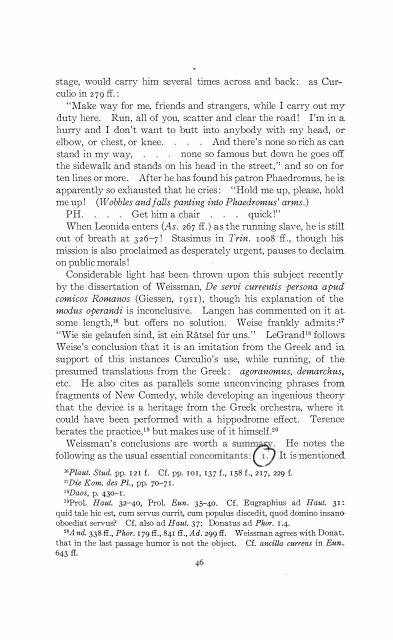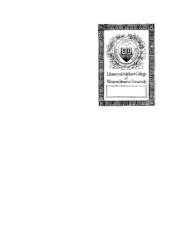Create successful ePaper yourself
Turn your PDF publications into a flip-book with our unique Google optimized e-Paper software.
stage, would carry him several times across and back : as Curculio<br />
in 279 ff. :<br />
"Make way for me, friends and strangers, while I carry out my<br />
duty here. Run, all of you, scatter and clear the road ! I'm in a<br />
hurry and I don't want to butt into anybody with my head, or<br />
elbow, or chest, or knee. And there's none so rich as can<br />
stand in my way, none so famous but down he goes off<br />
the sidewalk and stands on his head in the street," and so on for<br />
ten lines or more. After he has fO\1nd his patron Phaedromus, he is<br />
apparently so exhausted that he cries : "Hold me up, please, hold<br />
me up ! (Wobbles and falls panting into Phaedromus' arms.)<br />
PH. Get him a chair quick !"<br />
When Leonida enters (As. 267 ff.) as the running slave, he is still<br />
out of breath at 326-7 ! Stasimus in Trin. looS·ff., though his.<br />
mission is also proclaimed as desperately urgent, pauses to declaim<br />
on public morals !<br />
Considerable light has been thrown upon this subject recently<br />
by the dissertation of Weissman, De servi currentis persona apud<br />
comicos Romanos (Giessen, 1911), though his explanation of the<br />
modus operandi is inconclusive. Langen has commented on it at.<br />
some length,16 but offers no solution. Weise frankly admits F<br />
"Wie sie gelaufen sind, ist ein Ri'ltsel fur uns." LeGrand18 follows<br />
Weise's conclusion that it is an imitation from the Greek and in<br />
support of this instances Curculio's use, while running, of the<br />
presumed translations from the Greek : agoranomus, demarchus,<br />
etc. He also cites as parallels some unconvincing phrases from<br />
fragments of New Comedy, while developing an ingenious theory<br />
that the device is a heritage from the Greek orchestra, where it.<br />
could have been performed with a hippodrome effect. Terence<br />
berates the practice,19 but makes use of it himself.2°<br />
Weissman's conclusions are worth a sum He notes the<br />
following as the usual essential concomitants : 0 It is mentioned<br />
16Plaul. Slud. pp. 121 f. Cf. pp. 101, 137 f., 1 58 f., 217, 229 f.<br />
17Die Kom. des Pl., pp. 70-71.<br />
18Daos, p. 430-1.<br />
19Prol. Haul. 32-40, Prol. Eun. 35-40. Cf. Eugraphius ad Haul. 31 <br />
quid tale hic est, cum servus currit, cum populus discedit, quod domino insano<br />
oboediat servus? Cf. also ad HaUl. 37; Donatus ad Phor. 1.4.<br />
2°A nd. 338 ff., Phor. 179 ff., 841 ff., Ad. 299 ff. Weissman agrees with Donat.<br />
that in the last passage humor is not the object. Cf. ancilla currens in Eun.<br />
643 ff.
















